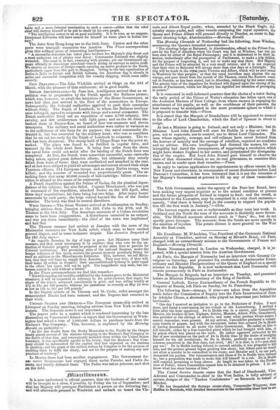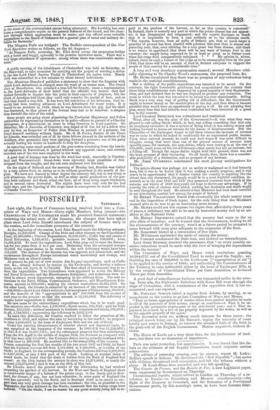Iflistellantous.
It is now understood in official quarters, that the business of the session will be brought to a close, if possible, by Friday the 1st of September; and that her Majesty will prorogue Parliament in person on the following day; and will afterwards proceed to Woolwich and embark on board the Vie- train and Albert Royal yacht; when attended by the Black Eagle, Ad- miralty steam-yacht, and other vessels composing the royal squadron' the Queen and Prince Albert will proceed directly to Dundee, en route to Bal- moral shooting-lodge, Aberdeenshire.—Morning Herald.
The Morning Chronicle of Wednesday had the following, from Windsor, concerning the Queen's intended movements-
" The shooting-lodge at Balmoral, in Aberdeenshire, offered to the Prince Con- sort by the Earl of Aberdeen when the Court was last at Windsor, has not yet been seen by either of the Royal Personages; and it is understood to be their in- tention, immediately after the prorogation of Parliament, to make a trip thither, for the purpose of inspecting it, and not to-make any stay there. Her Majesty and the Pnnce will be attended by a very small retinue, and it is not expected that their visit to Balmoral will occupy more than nine days or a fortnight. The trip will be made in the royaljacht Victoria and Albert, which will be sent round to Woolwich for that purpose; so that the royal travellers may shorten the sea voyage, and pass direct from the mouth of the Thames round the Eastern coast, not to Dundee, as has been stated, but to Aberdeen, returning by the same course. The precise time of the departure for Scotland will depend upon the closing of the session of Parliament, which her Majesty has signified her intention of proroguing in person."
It is rumoured in well-informed quarters that the choice of a tutor during the early period of the Prince of Wales's education has fallen upon one of the Assistant Masters of Eton College; from whose success in engaging the attachment of his pupils, as well as the confidence of their parents, the best results may be anticipated in the more prominent sphere to which it is proposed to transfer him.—Times.
It is stated that the Marquis of Breadalbane will be appointed to succeed to the office of Lord Chamberlain, which the Earl of Spencer is about to resign.
At last a Minister is going to Ireland; and not only a Minister, but the Minister. Lord John Russell will start for Dublin in a day or two. Be goes, not to supersede, nor to control, nor to direct Lord Clarendon. The man whose sagacity, courage, and self-reliance have saved Ireland from the horrors of anarchy and the carnage of rebellion, required no coadjutor and no adviser. His own intelligence had dictated the means, his own intrepidity had dared the consequences, of suppressing a revolution which might have shaken England to her centre, and perpetuated the disorganiza- tion of the empire. But Lord John Russell goes himself to observe the state of that distracted island, to see its real grievances, to examine their causes, and to confer upon their remedies.—Times.
In reply to various applications for appointments to offices vacant in the New Forest and elsewhere, in consequence of recent disclosures before Lord Duncan's Committee, it has been intimated that it is not the intention of her Majesty's Government at present to fill up any of these vacancies.— Globe.
The Irish Government, under the agency of the Poor-law Board, have been making very urgent inquiries as to the actual condition at present and the future prospects of Ireland in respect to food; and the result, as committed to the Executive, may be comprised in a very short sentence,— namely, "that there is barely food in the country to support the popula- tion till the first week in January."— Globe.
The harvest reports are not so unfavourable as they were last week. In Scotland and the North the tone of the accounts is decidedly more favour- able. The Midland accounts abound much in "fears," &c., but do not specify grave damages. The accounts from the South are more specific in the mention of injuries. The potato disease is more general on the West than the East coast.
His Excellency M. D'Andrian, Vice-President of the Germanic National Assembly at Frankfort, arrived on Monday at Mivart's Hotel, via Paris, charged with an extraordinary mission to the Governments of France and England.—Morning Chronicle.
Baron Neumann arrived in London on Wednesday, charged, it is ..-re ported, with a special mission from the Austrian Government.
At Paris, the Manna; of Normanby had an interview with General Ca- vaignac on Saturday, and presented his credentials as Ambassador Extra- ordinary and Minister Plenipotentiary of the Queen of England on a special mission to the Republic. It is now understood that Lord Normanby will remain permanently in Paris as Ambassador.
The Marquis de Brignole had an interview on Tuesday, and presented letters as Minister Plenipotentiary of the King of Sardinia.
General Lefloch, Envoy Extraordinary of the French Republic to the Emperor of Russia, left Paris on Sunday, for St. Petersburg.
The following facts—strange, if true—are taken from the depositions made before the Commission of Inquiry into the Paris Insurrection of June, by Adolphe Chenu, a shoemaker, who played an important part behind the barricades.
"One day I received an invitation to go to the Prefecture of Police. I went there, and found a convocation for ten o'clock at the Luxembourg. I arrived little after the hour appointed. De la Hodde was in a corner, and Caussidiera Mercier, his brother-in-law, Tiphane, Sobrier, Meunier, Albert, Pile, Grandmenil, who presided at the sittings at Albert's, and some other persons whose names I cannot remember, were present. At my arrival, Cansaidiere produced a volumi- nous bundle of papers, and with the documents before him accused De is Hodde of having denounced us all under the fallen Government. He called on him to kill himself, either by a four-barrelled pistol which he had brought with him, or by poison which was placed on the table. Be rather appeared animated by the fear of new revelations on the part of De Is Hodde than by the desire of avenging himself for his old revelations; for De la Hodde, perfectly an courant to the schemes conceived in the first days, had cried, 'Au! it is that, is it ?—you shall pay me!' De la Hodde having refused to commit suicide, it was proposed to kill him, and the persons present began pushing him about: but Albert said he would not allow a murder to be committed in his room; and Meunier and I, on our part, demanded his pardon. Our remonstrances and those of De la Hodde were listened to; but a proposition was made to make him kill himself in a cab. De is Hodde still resisted, promising to keep silence. At length he was taken to the Prefec- ture of Police; where Caussidiere caused him to be detained in prison. I do not know what has since become of him."
The United Service Gazette states that the Earl of Dundonald, Vice- Admiral and Commander-in-chief in the West Indies, is fully advised of certain designs of the "Yankee Confederates" on Bermuda in behalf of Mitchel. "He has despatched the Scourge steam-sloop, Commander Wingrove, from Halifax to Bermuda, with detailed instructions to the authorities there how to act
in the event of the contemplated rescue being attempted. His Lordship has sent home a comprehensive report on the general defences of the island, and the chan- nels through which approaches must be made; and has offered some valuable suggestions to the Board of Ordnance for a general plan of naval and military de- fences for Bermuda."
The Niagara Falls are bridged! The Buffalo correspondent of the New York Spectator writes as follows' on the 2c1 August— "At Niagara Falls, yesterday, Mr. Ellet drove across the suspension-bridge with a horse and buggy, agreeably to his promise heretofore made. There was a eery large attendance of spectators; among whom there was considerable excite- ment'
A public meeting of the inhabitants of Chelmsford was held on Saturday, at the Shire-hall, to take measures for carrying out the project of erecting a statue to the late Lord Chief Justice Tindal in Chelmsford, his native town. Nearly 1001. was subscribed in a few minutes by about twenty individuals.
The .Montrose Standard publishes a statement to show that the forgeries with which Lord Arbuthnott is charged were the work of an insane man. The Grand Jury at Stonehaven, who returned a true bill for forgery, made a representation to the Lord-Advocate of their belief that the offender was insane: they had wished formally to inquire into the point in their capacity of jurymen, but the Clerk of Arraigns told them they could only consider the matter of fact, and on that they found a trite bill. It has been the conviction of his intimates, that in- sanity had been making advances on Lord Arbuthnott for many years. It is traced to an accident in 1829, when he was thrown from his gig, and his skull was fractured, so that pieces of the frontal bone had to be removed: a surgeon then foretold the rain of the mind- Some people are going about plundering the Provincial Magistracy and Police authorities by representing themselves to be police-officers in pursuit of a Chartist delinquent or a detachment en route to bring deserters to head-quarters. On Saturday, Mr. J. Jacombs, of Coventry, was duped of 21. 12s. 6d. by a fellow who said he was an Inspector of Police from Weedon in pursuit of a prisoner, but found himself suddenly without funds. Mr. G. H. Packs, Justice of the Peace for Lincoln, was swindled out of 2/. by three fellows dressed in the uniform of the Artillery, who pretended they were carrying forward a prisoner; one of the party actually having his wrists in handcuffs to help the deception.
In removing some small portions of the gun-cotton remaining from the late fa- tal explosion at Faversham, it ignited without any apparent cause, and severely scorched one of the two men employed in the work.
A good deal of damage was done by the wind last week, especially in Camber- land and Westmoreland : forest-trees were uprooted, large quantities of frui stripped from the boughs, and the cut corn scattered over the land.
On the night of Sabbath and the morning of Monday last, Brechin was visited by a very severe frost, so strong as to be without precedent in the month of Au- gust. We have not learned to what degree the mercury fell; but in low-lying or cold situations, the potato-fields as well as other exotic productions of our gar- dens both culinary and floral, attest the fact; all of them being much blackened, and in several cases destroyed. The nights have been very cold for the last eight days, and the ripening of the crops must in consequence be much retarded. —Dundee Courier.



























 Previous page
Previous page